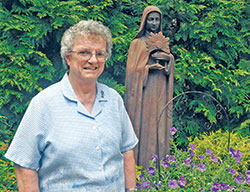New superior leaves comfort zone in accepting leadership

Franciscan Sister Christa Franzer poses beside a statue of St. Clare of Assisi on the grounds of the Oldenburg motherhouse of her community, the Congregation of the Sisters of the Third Order of St. Francis. On April 15, she was elected the superior, known as congregational minister, of the community and will serve in that role for a six-year term. (Photo by Sean Gallagher)
By Sean Gallagher
OLDENBURG—Throughout much of her 50 years of religious life, Franciscan Sister Christa Franzer has been asked to serve in ministries she would never have planned for herself.
She never expected to be principal of Oldenburg Academy of the Immaculate Conception in Oldenburg.
She could have never imagined serving as director of human resources at Marian University in Indianapolis.
And she certainly didn’t foresee being elected on April 15 as the superior, known as congregational minister, of her community, the Congregation of the Sisters of the Third Order of St. Francis in Oldenburg.
As congregational minister, Sister Christa is the 16th successor of Mother Theresa Hackelmeier, who founded the Oldenburg Franciscans in 1851.
But Sister Christa sees venturing out of her comfort zone one time after another as an expression of her embrace of religious life, which has a vow of obedience at its heart.
Ultimately, that obedience is to the will of God.
“That’s what obedience is, after all—listening to God, [including] God speaking through other people,” Sister Christa said.
At the same time that Sister Christa was elected congregational minister of the Oldenburg Franciscans, three other sisters were elected as members of the community’s council, which will assist and work with Sister Christa as a leadership team. They are Franciscan sisters Delouise Menges, Barbara Leonhard and Annette Grisley. Their six‑year term of office began on July 1.
“We have a wonderful team,” Sister Christa said. “I’ve already been very impressed.”
Sister Christa served two previous terms on the community’s council, from 1994-2000 and from 2006-12. The other sisters on the recently elected council are new to community leadership.
“I assured them from the beginning that, though I might share a way that we’ve done something previously,” Sister Christa said, “I do not ever want to make it seem that, because this was the way we did it before, we have to do it the same way now.”
The April 15 election was preceded by several months of discernment by the Oldenburg Franciscans of what their priorities should be as a community, and who best among them could lead them in carrying them out.
Over that time of prayerful consideration, Sister Christa learned that many of her fellow Franciscans were serious in seeing her as a possible leader for the community.
At first, she laughed off such suggestions.
“Teasingly, I would say, ‘You mean two terms weren’t enough?’ ” Sister Christa recalled.
But when the calls for her to consider serving in leadership started to come from a wide variety of sisters throughout the community, she became more serious—and more prayerful—during a time when she doubted whether she could serve in this way.
“My spiritual director encouraged me to pray through those hesitations,” Sister Christa said. “It’s good to have expressed and acknowledged them. But you can get past them by praying through them.”
The community expressing its will on April 15 was an emotional experience for Sister Christa and the others elected to the council.
“It was pretty overwhelming,” Sister Christa recalled. “To have that kind of support to be called forth from the community is really a powerful experience.”
As congregational minister, Sister Christa will oversee the ministry of all the members of her community, including the many who serve the Church in central and southern Indiana. She will also be involved in two institutions that have a long and continuing history of building up the life of the archdiocese: Oldenburg Academy and Marian University.
Sister Christa spoke with pride about how Marian in particular has for generations trained educators who have served in Catholic schools across the central and southern Indiana, and now is involved in forming future priests through its partnership with Bishop Simon Bruté College Seminary in Indianapolis.
“It’s all a source of real pride,” she said. “It’s a great blessing to be able to hear that and be aware of the influence that we’ve had and continue to have.”
Sister Christa hopes in the coming six years to broaden that influence by helping to carry out her community’s priorities, which include focusing on care of creation, helping women and children in poverty and becoming more rooted in their Franciscan spirituality.
But she recognizes that there will be challenges for these goals because of “the fact that we are aging, that our numbers are declining.”
That reality, though, does not dampen Sister Christa’s conviction that religious life will continue to be important in the life of the Church and that the Oldenburg Franciscans will contribute to it.
“It’s not going to be the same religious life of 40 or 50 years ago,” Sister Christa said. “But certainly some form of religious life will continue. So we want to be part of that new growth in whatever ways we can.”
An expression of religious life in the future that she sees as critical is to follow the call of Pope Francis in accompanying through times of joy and sorrow those with whom and around whom they live.
“I think the real focus this time is on our presence, who we are to people and relationships with people,” Sister Christa said. “Franciscans concentrate on relationships. That aspect of presence is what we probably are going to be remembered for more than building hospitals and teaching in schools.”
(To learn more about the Oldenburg Franciscans, visit oldenburgfranciscans.org.) †
